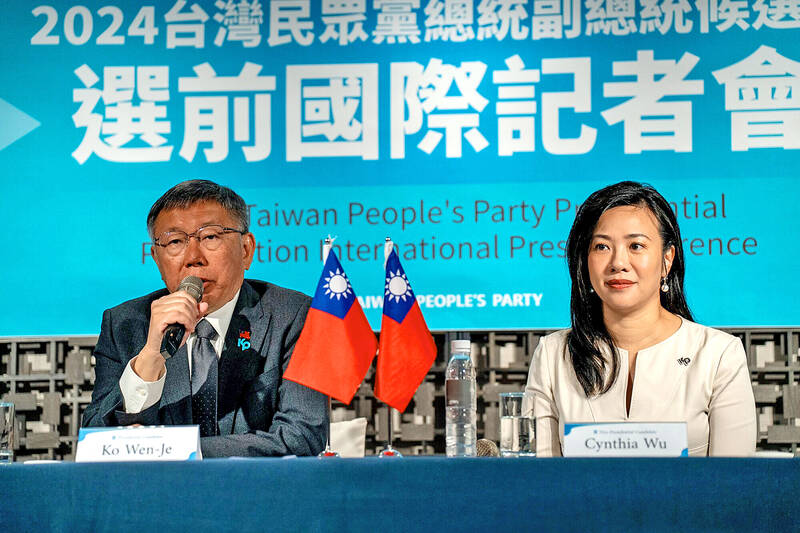Taiwan People’s Party (TPP) Chairman and presidential candidate Ko Wen-je (柯文哲) yesterday said that, if elected, he would first ensure that Taiwan’s relationship with the US remains solid before attempting to open communications with China.
At a press conference, Ko was questioned about strained cross-strait relations and how he would navigate this situation alongside Taiwan’s ties with the US if elected.
Ko said that the US is Taiwan’s most important ally and also the most powerful country in the world.

Photo: Bloomberg
“We will definitely maintain a solid relationship between Taiwan and the US, and on that foundation, we will be open to starting communications with China,” he said at the press event, which was livestreamed on YouTube.
The TPP’s approach would involve prioritizing seamless communications with the US to prevent any unexpected developments, thereby establishing a foundation of mutual trust, he said.
Ko said he would work with Beijing whenever the opportunity for cooperation arises and will compete with China when necessary, as part of his strategy to navigate the tense cross-strait situation.
Ko, a former Taipei mayor who founded the TPP in 2019 and has won a passionate support base, especially among young people by putting issues like the high cost of housing and low wages at the center of his campaign, said Taiwan needs to break the traditional two-party mould to achieve real change.
Repeating one of his talking points on the campaign trail, Ko said the Democratic Progressive Party (DPP) has a “tendency to confront Beijing even in cooperative scenarios,” while the Chinese Nationalist Party (KMT) seeks cooperation with China even when the situation requires confrontation.
“Among the current trio of candidates, Ko Wen-je is the only person who is acceptable to both China and the United States. This is currently my biggest advantage,” he said.
Generally, Taiwan should express its willingness to engage in communications with China, while maintaining a non-negotiable stance on the preservation of its free and democratic political system and way of life, he said.
Ko said that no one should depend solely on the goodwill of another country for security, as part of his response to a CBS reporter’s question on whether he thought he could alter Chinese President Xi Jinping’s (習近平) objective of China’s unification with Taiwan.
“Taiwan must have the capacity to protect itself,” and as such, must prioritize “deterrence and communication” in its policy toward Beijing, Ko said.
“If it comes to a military confrontation, Taiwan will be no match for the mainland,” he said. “However, Taiwan must make it very clear to China that ‘if you choose to engage in conflict, you will have to pay a hefty price,’” he added.
Elaborating on his national defense policies, Ko said he would seek to increase Taiwan’s defense budget to 3 percent of GDP, above the record 2.5 percent the administration of President Tsai Ying-wen (蔡英文) proposed in its 2024 budget.
Additional reporting by Reuters

Travel agencies in Taiwan are working to secure alternative flights for travelers bound for New Zealand for the Lunar New Year holiday, as Air New Zealand workers are set to strike next week. The airline said that it has confirmed that the planned industrial action by its international wide-body cabin crew would go ahead on Thursday and Friday next week. While the Auckland-based carrier pledged to take reasonable measures to mitigate the impact of the workers’ strike, an Air New Zealand flight arriving at Taipei from Auckland on Thursday and another flight departing from Taipei for Auckland on Saturday would have to

The manufacture of the remaining 28 M1A2T Abrams tanks Taiwan purchased from the US has recently been completed, and they are expected to be delivered within the next one to two months, a source said yesterday. The Ministry of National Defense is arranging cargo ships to transport the tanks to Taiwan as soon as possible, said the source, who is familiar with the matter. The estimated arrival time ranges from late this month to early next month, the source said. The 28 Abrams tanks make up the third and final batch of a total of 108 tanks, valued at about NT$40.5 billion

A group from the Taiwanese Designers in Australia association yesterday represented Taiwan at the Midsumma Pride March in Melbourne. The march, held in the St. Kilda suburb, is the city’s largest LGBTQIA+ parade and the flagship event of the annual Midsumma Festival. It attracted more than 45,000 spectators who supported the 400 groups and 10,000 marchers that participated this year, the association said. Taiwanese Designers said they organized a team to march for Taiwan this year, joining politicians, government agencies, professionals and community organizations in showing support for LGBTQIA+ people and diverse communities. As the first country in Asia to legalize same-sex

MOTIVES QUESTIONED The PLA considers Xi’s policies toward Taiwan to be driven by personal considerations rather than military assessment, the Epoch Times reports Chinese President Xi Jinping’s (習近平) latest purge of the Chinese People’s Liberation Army (PLA) leadership might have been prompted by the military’s opposition to plans of invading Taiwan, the Epoch Times said. The Chinese military opposes waging war against Taiwan by a large consensus, putting it at odds with Xi’s vision, the Falun Gong-affiliated daily said in a report on Thursday, citing anonymous sources with insight into the PLA’s inner workings. The opposition is not the opinion of a few generals, but a widely shared view among the PLA cadre, the Epoch Times cited them as saying. “Chinese forces know full well that